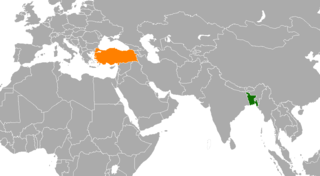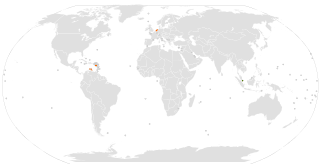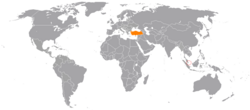
Singapore maintains diplomatic relations with 188 UN member countries. The exceptions are Burundi, Central African Republic, Monaco and South Sudan.

Russia–Singapore relations are the bilateral foreign relations between the two countries, Russia and Singapore. Russia has an embassy in Singapore. Singapore has an embassy in Moscow. Both countries are full members of APEC. Relations between the 2 countries have been friendly since bilateral ties were established. Due to the 2022 Russian invasion of Ukraine, relations became tense after Singapore imposed sanctions against Russia.

India-Singapore relations, also known as Indian-Singaporean relations or Indo-Singaporeanrelations, are the bilateral relations between India and Singapore. Relations between the two countries have traditionally been strong and friendly, with the two nations enjoying extensive cultural and commercial relations. India and Singapore have signed the Comprehensive Economic Cooperation Agreement (CECA) and strategic-relationship agreement in order to increase trade, investments and economic cooperation, and expanded bilateral cooperation on maritime security, training forces, joint naval exercises, developing military technology and fighting terrorism.

Bulgaria–India relations are the international relations that exist between the Republic of Bulgaria and the Republic of India.

Israel–Singapore relations, also referred to as Israeli–Singaporean relations, refers to the bilateral relations between the State of Israel and the Republic of Singapore. Relations between the two countries have been extremely cordial for more than half a century, which are influenced by their similar geopolitical state of affairs, being relatively small states surrounded by larger neighbors hostile to their continued existence.

Philippines–Singapore relations are bilateral relations between the Philippines and Singapore. The Philippines has an embassy in Singapore. Singapore likewise, has an embassy in Manila. Full diplomatic relations commenced on May 16, 1969, when the Philippine consulate-general in Singapore was raised to embassy level.

Indonesia and Turkey established diplomatic relations in 1950. Diplomatic relations are particularly important because both are Muslim-majority countries as well as modern democracies. Indonesia has an embassy in Ankara and consulate-general in Istanbul. Turkey has an embassy in Jakarta, and honorary consulate in Medan since May 1996. Both countries are full members of the World Trade Organization (WTO), Organisation of Islamic Cooperation (OIC), D-8 Organization for Economic Cooperation, MIKTA and the G-20 major economies.

Shanmugam Kasiviswanathan, better known as K. Shanmugam, is a Singaporean politician and lawyer who has been serving as Minister for Law since 2008 and Minister for Home Affairs since 2015. A member of the governing People's Action Party (PAP), he has been the Member of Parliament (MP) representing the Chong Pang division of Nee Soon GRC since 2011.

Singapore–United Kingdom relations, also referred to as British–Singaporean relations, are the relations between the states of Singapore and the United Kingdom. Both countries are full members of the Commonwealth of Nations and are marked by historical, cultural, institutional and language ties, extensive people-to-people links, aligned security interests, sporting tournaments, and significant trade and investment co-operation.

Pakistan–South Korea relations refers to bilateral diplomatic relationship between Pakistan and South Korea. Since the 1980s, the relations between two Asian states have improved and periodically enhanced. Pakistan has an embassy in Seoul, South Korea, and South Korea has an embassy in Islamabad, Pakistan. Pakistan is one of the few countries that has good relations with both North Korea and South Korea.

Germany–Singapore relations refer to the bilateral relations between the Federal Republic of Germany and the Republic of Singapore.

Indonesia and Singapore established diplomatic relations ) on 7 September 1967, a month after the formation of the Association of Southeast Asian Nations (ASEAN) on 8 August 1967. Indonesia and Singapore are two of the five founding members of ASEAN. Both nations are also members of the Non-Aligned Movement and APEC.

Bangladesh–Turkey relations are the bilateral relations between Bangladesh and Turkey. Both countries are members of the Organisation of Islamic Cooperation. Turkey has an embassy in Dhaka and Bangladesh has an embassy in Ankara and a consulate in Istanbul.

North Korea–Singapore relations are bilateral relations between North Korea and Singapore.

Netherlands–Singapore relations refers to the bilateral relations between the Kingdom of the Netherlands and the Republic of Singapore. Upon Singapore's declaration of independence in August 1965, the Netherlands recognized Singapore as a sovereign state and established diplomatic relations with it, becoming one of the first European countries to do so. The Netherlands maintains its embassy in Singapore, while Singapore is represented in the Netherlands through its embassy in Brussels, Belgium.

Bilateral relations between the Republic of Singapore and the Kingdom of Thailand formally date to 1965, when Thailand established diplomatic relations soon after the independence of Singapore. Both countries are the founding members of the Association of Southeast Asian Nations.

The earliest modern contact between Mongolia and the Republic of Singapore started in 1950, and both countries established diplomatic relations in 1970.

Singapore and European Union relations refers to the bilateral relations between the Republic of Singapore and the European Union. The two entities generally maintain good relations. Their leaders hold regular exchanges, and Singapore has an extensive network of embassies within the European Union. Singapore's relations with the European Union date back to Singapore's independence in 1965, and to date, they have signed multiple agreements.




















